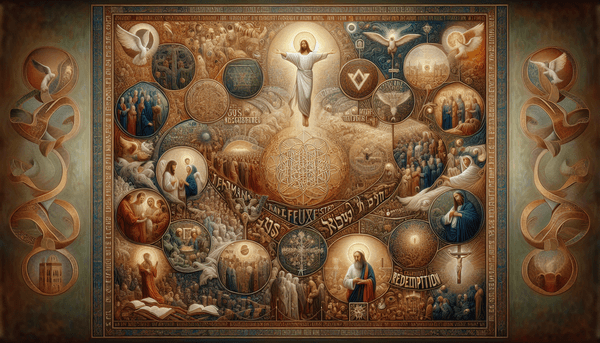The Importance of a Close Relationship with God
Central to the Christian faith is the concept that a close relationship with God is paramount to achieving salvation and eternal life in heaven. Jesus Christ Himself established this principle, stating, \"I am the way, and the truth, and the life. No one comes to the Father except through me\" (John 14:6). This exclusive path to salvation is characterized by faith in Jesus and His sacrifice for our sins, as well as the repentance that leads to a life transformed by His love. It is through this relationship that believers can find assurance of salvation, as the Bible teaches that \"if we confess our sins, He is faithful and just to forgive us our sins and to cleanse us from all unrighteousness\" (1 John 1:9). Indeed, God's desire is not for any to perish but for all to come to repentance and embrace the gift of eternal life (2 Peter 3:9).
Understanding God's Justice and the Reality of Hell
God's justice and holiness are central to His nature, and the Bible clearly teaches that there are consequences for rejecting Him and His ways. Hell is described as a place of eternal separation from God and His goodness, the result of a deliberate choice to reject God's love and grace. In the scriptures, we find stark reminders of this reality, with verses like \"For the wages of sin is death, but the free gift of God is eternal life in Christ Jesus our Lord\" (Romans 6:23), and \"Then they will go away to eternal punishment, but the righteous to eternal life\" (Matthew 25:46). God's ultimate desire is that none should face this judgment, but rather that everyone should find salvation through Jesus Christ, as \"He is patient toward you, not wishing that any should perish\" (2 Peter 3:9).
Divine Communication Through Dreams and Visions
Throughout the biblical narrative, God has often communicated with His people through dreams and visions. This method of divine communication is affirmed in passages such as \"And it shall come to pass afterward, that I will pour out my Spirit on all flesh; your sons and your daughters shall prophesy, your old men shall dream dreams, and your young men shall see visions\" (Joel 2:28). Such profound experiences were not limited to the Old Testament. The New Testament echoes this phenomenon, as seen when Joseph, the husband of Mary, is guided by God through dreams (Matthew 2:12-13). In discerning and interpreting these divine messages, believers are encouraged to seek spiritual counsel, immerse themselves in prayer, and reflect upon the Word of God for understanding and guidance.
The Power and Purpose of Spreading the Gospel
The Great Commission, entrusted to believers by Jesus, compels Christians to spread the gospel to the ends of the earth. This mission is rooted in the command to \"Go therefore and make disciples of all nations, baptizing them in the name of the Father and of the Son and of the Holy Spirit\" (Matthew 28:19-20). Sharing the good news of salvation is an act of love and obedience, with the potential to impact both individual lives and the larger global community. The power of the gospel is such that it is \"the power of God for salvation to everyone who believes\" (Romans 1:16), and believers are encouraged to adapt their approach to reach as many as possible, becoming \"all things to all people, that by all means I might save some\" (1 Corinthians 9:22).
The Unparalleled Love of Jesus
The love of Jesus Christ is unparalleled and serves as the greatest example of sacrificial love. Scripture vividly portrays this love, stating that \"Greater love has no one than this, that someone lay down his life for his friends\" (John 15:13). Jesus' love was demonstrated through His willingness to die on the cross for our sins, a love that was not conditioned by our worthiness but was freely given, for \"God shows his love for us in that while we were still sinners, Christ died for us\" (Romans 5:8). Experiencing Jesus' unconditional love is transformative, and it is this love that compels us to pursue a closer relationship with God and share His message with the world.
FAQ
Q: Why does God send people to Hell?
A: According to Christian belief, God does not desire to send anyone to Hell. Rather, Hell is the consequence of a person's choice to reject God's offer of salvation through Jesus Christ. God's justice requires that sin be punished, but He offers grace and forgiveness through Jesus to all who believe and repent.
Q: Can a close relationship with God ensure my entry into Heaven?
A: Yes, Christianity teaches that a personal relationship with Jesus is essential for salvation. Belief in Jesus and His sacrifice for sins, along with repentance and living a life in accordance with His teachings, is the pathway to eternal life in Heaven as stated in John 14:6.
Q: How can I know if God is communicating with me through dreams?
A: While not all dreams are messages from God, the Bible shows that God has used dreams to communicate with people. It's important to prayerfully consider the content of dreams, seek wise counsel from spiritual leaders, and compare the message with the teachings of the Bible for confirmation.
Q: What does it mean to be born again?
A: Being born again means experiencing a spiritual rebirth, where one's life is transformed by the power of the Holy Spirit. This change is marked by a new heart, new desires, and a new way of life that aligns with God's will and purposes as described in John 3:3 and 2 Corinthians 5:17.





